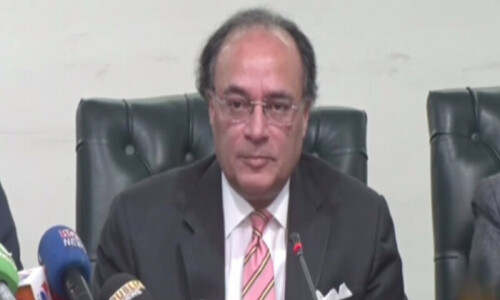WASHINGTON/KARACHI: The International Monetary Fund (IMF) has included Pakistan on its Executive Board agenda for January 11, as reported on its updated website.
During this meeting, the board is set to deliberate and potentially grant final approval for the disbursement of the next $700 million tranche under the existing $3 billion Stand-By Arrangement (SBA).
According to the IMF Executive Board calendar, upcoming meetings are scheduled for Jan 8, 10 and 11, with Pakistan’s case slated for discussion on the last day. The current IMF programme, amounting to $3bn, is expected to conclude in the second week of April, with approximately $1.8bn remaining undisbursed. The initial tranche of $1.2bn was released in July.
In November 2023, a Staff-Level Agreement was reached between the IMF staff and Pakistani authorities regarding the first review under Pakistan’s SBA. This agreement is contingent upon approval by the IMF’s Executive Board. Despite expectations for board approval in December, it seems the process has been scheduled for Jan 11.
This development holds significance for Pakistan’s economic landscape as the disbursement of the next tranche could provide much-needed financial support. The outcome of the upcoming meeting will shape the trajectory of the ongoing economic cooperation between Pakistan and the IMF.
“Discussions between the IMF staff and the authorities on policies to strengthen macroeconomic stability in the coming year continue, and important progress has been made over the FY23 budget,” the IMF said in another statement.
The IMF also updated economic projections and data for Pakistan, depicting a challenging outlook for the country in 2024. According to the IMF’s latest figures, the projected real GDP for the year is anticipated to experience a contraction of 0.5pc, indicating potential economic headwinds.
Simultaneously, the projection for the Consumer Price Index in 2024 shows a significant increase. This suggests a substantial rise in inflation, posing additional challenges for the country’s economic stability.
Economic reforms
Despite a surprise jump of $853m in the reserves of the State Bank in the week ending on Dec 22, 2023, Pakistan is keen to receive the second tranche which shows Islamabad has fulfilled the IMF’s demands for economic recovery.
The Ministry of Finance has recently announced that the July-December revenue collection target of Rs4.425 trillion, given by the IMF, has successfully been surpassed by Rs43bn.
After securing the second tranche of $700m this month, Pakistan is more likely to receive the remaining amount in March under the $3bn SBA.
However, Caretaker Finance Minister Shamshad Akhtar had already informed the nation that the country needs to enter a new agreement with the IMF for the support of the economy. There is no hope that Pakistan could say goodbye to the lending agency. Despite tough conditions, Pakistan is still facing very high inflation which clocked in at 29.7pc for December from 29.2pc in the preceding month.
The latest data reveals that Pakistan has engaged in 24 arrangements with the IMF since becoming a member on July 11, 1950. This underscores the country’s historical reliance on IMF support to address economic challenges.
Published in Dawn, January 2nd, 2024














































